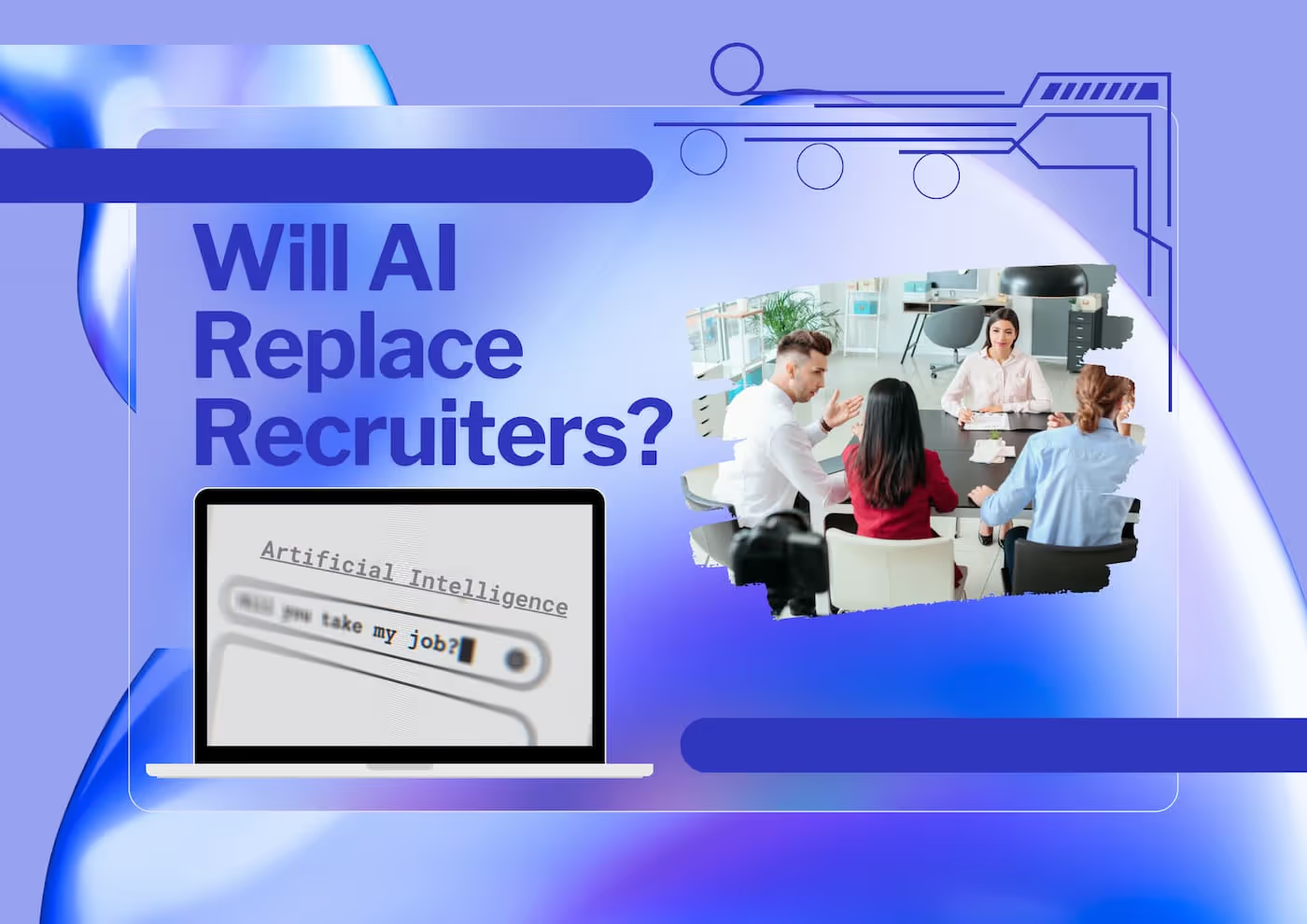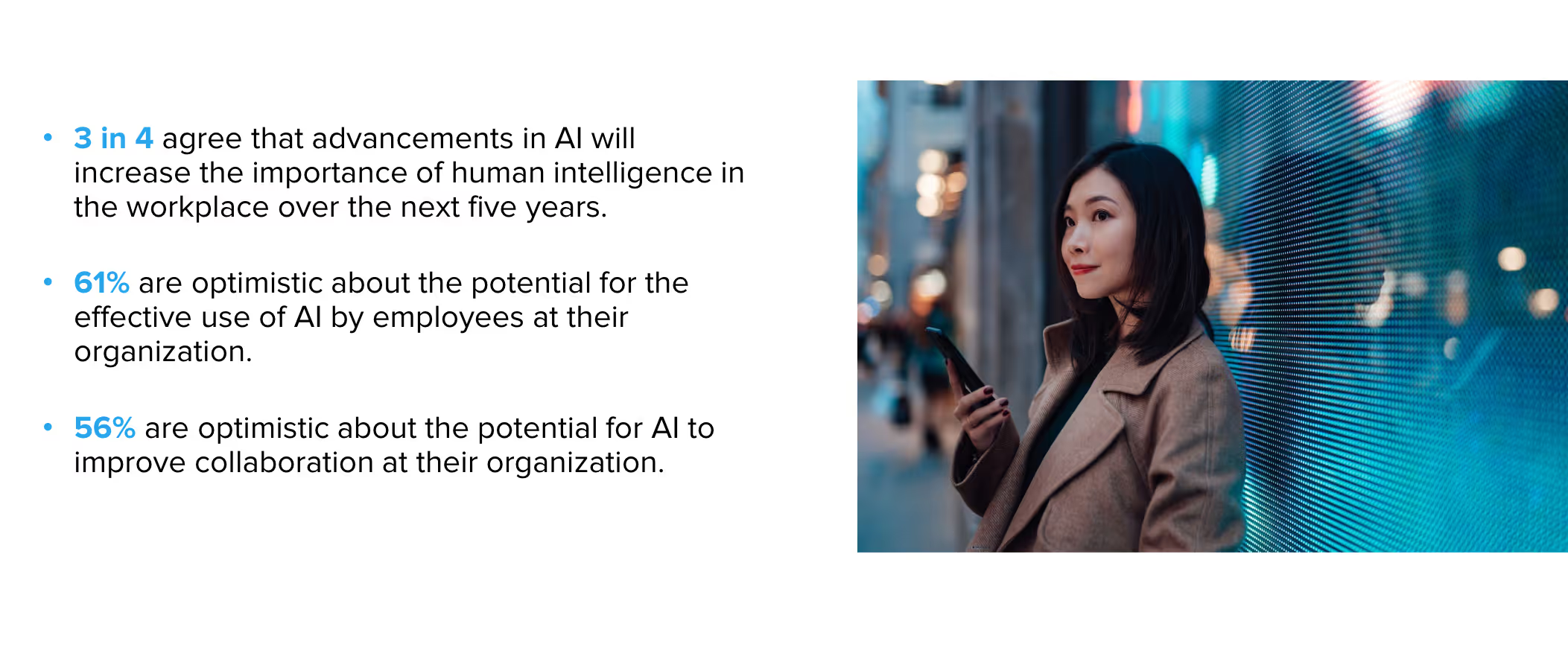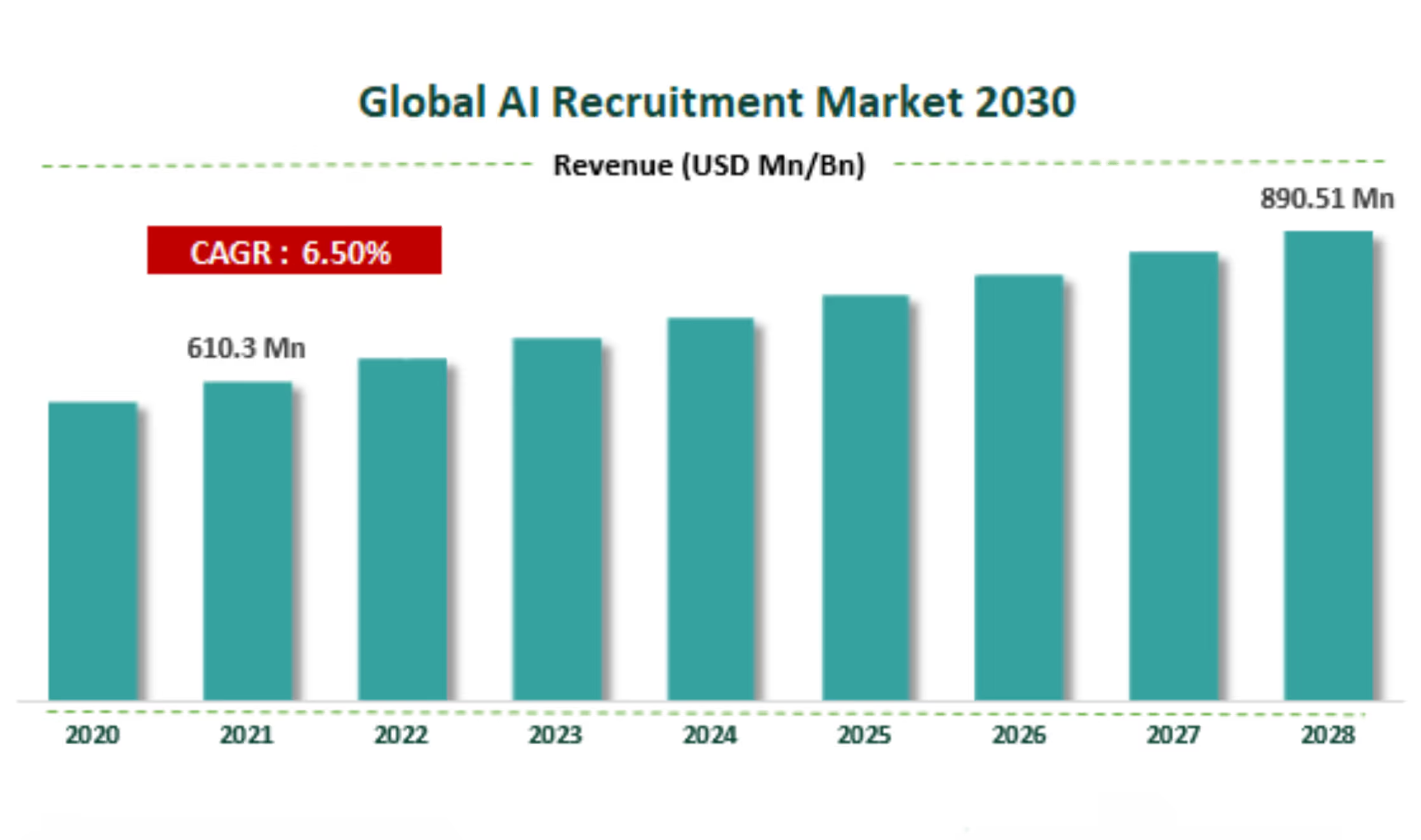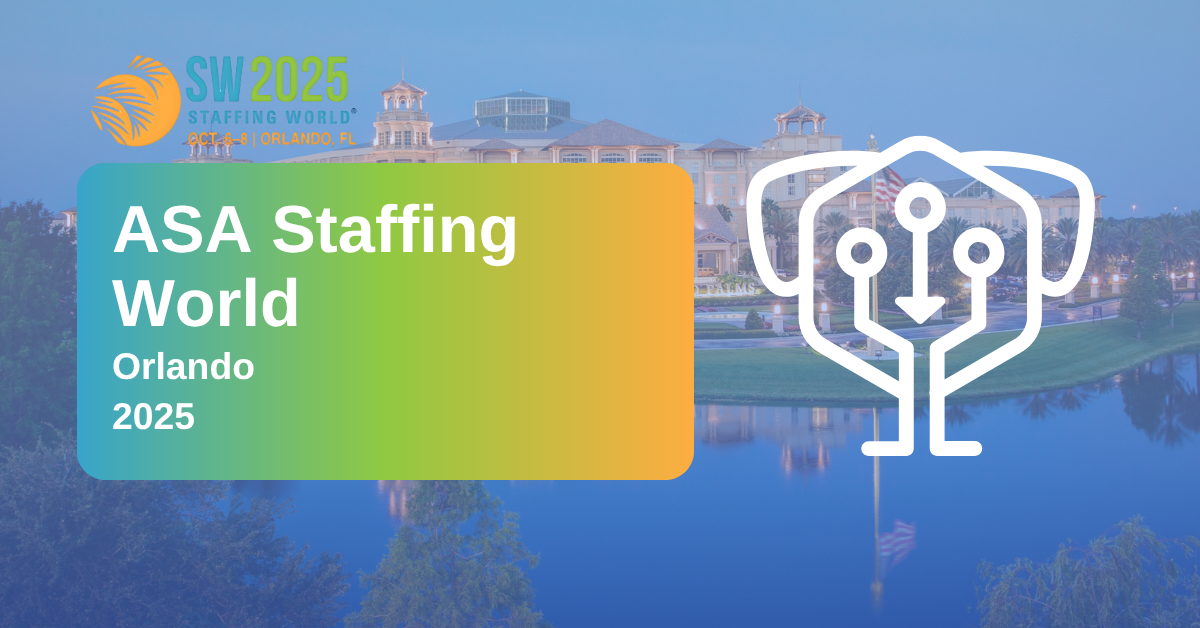Will AI Replace Recruiters?
As AI tools advance at an exceptional rate, it raises the question: will AI take over recruiting entirely? The short answer - no, but let's dive deeper into why this is the case, and how AI recruiting tools are actually the sidekick hiring managers and recruiters needed, not the replacement they’re wary of.

As AI tools advance at an exceptional rate, it raises the question: will AI take over recruiting entirely? The short answer - no, but let's dive deeper into why this is the case, and how AI recruiting tools are actually the sidekick hiring managers and recruiters needed, not the replacement they’re wary of.
Will AI Replace Recruiters?
We live in a rapidly changing digital era, where every news article, startup, and social media post seem to be related to artificial intelligence (AI), and how it’s become a transformative force across various industries, including recruitment. As AI tools advance at an exceptional rate, it raises the question: will AI take over recruiting entirely? The short answer - no, but let's dive deeper into why this is the case, and how AI recruiting tools are actually the sidekick hiring managers and recruiters needed, not the replacement they’re wary of.
The Current Landscape
If you’re a hiring manager, or recruiter, then you’d know that AI in recruiting is already making significant strides through the industry. From automating repetitive tasks to providing data-driven insights, AI is completely reshaping the way companies find and hire top talent. And now we even have AI tools like HeyMilo AI that conduct live AI-interviews, offering engaging, real-time conversational AI-powered voice agent that adapt to the candidate.
According to PandoLogic’s report on AI-driven recruitment efficiency, platforms have improved hiring outcomes by up to 30%. These tools have the ability to analyze massive amounts of data with ease, and interview at scale to reduce the time and effort required by human recruiters, but in order to retain the human-to-human process it doesn’t have the capabilities to take over a recruiter’s core responsibilities.
Let’s go over some of the pros and cons of AI recruiting tools to gain a fairer perspective:
Benefits of AI tools in Recruiting
According to a 2024 SHRM survey of over 2,300 HR professionals in January, where over 2300 HR professionals across various different industries, and companies, were asked a variety of survey questions, one of the most notable findings was the optimism most HR professionals about the potential AI had to benefit their organization:

Efficiency:
AI can handle high volumes of applications 24/7, screening candidates based on job description, behavioral criteria, and overall fit to the role. It’s able to engage with candidates to build reports that can be passed onto recruiters to narrow the talent pool. According to PandoLogic, AI can screen resumes much faster than humans, ensuring that only the most qualified candidates move forward, this allows recruiters to focus on strategic hiring and relationship building.
Unbiased:
In the fast paced corporate world we live in, companies are consistently looking to promote inclusive company culture, and AI algorithms can ensure just that. They can be programmed to ignore factors that could lead to bias, such as gender, age, or ethnicity. Imagine a world where companies that discriminate are non-existent - yes, humans may have some sort of pre-existing bias, but AI doesn’t, which is why we’re going to see companies adopt these algorithms at an exponential rate. However, Nexford University’s perspective on bias in AI hiring explains that the effectiveness of this all depends on how well the AI is trained, and the data it uses.
Data-Driven Decisions:
One of AI’s best abilities is to be able to provide insights based on data-driven analysis. As companies continue to collect widespread data on all of their metrics including when hiring employees, AI helps their recruiters make more informed decisions, but it can lead to overall more informed hiring outcomes and higher employee retention rates.
AI in Recruiting: Challenges and Concerns
Despite its many benefits, the integration of AI in recruiting is not without its challenges. The biggest challenge some may argue is fear; fear of job displacement, losing the human touch, and losing one’s privacy to a machine. Not only that, but this tsunami that AI is carving out in the recruitment industry won’t be an adoptable model for many business owners just now, it’s going to take education, trust, and real results to convince businesses to integrate AI into their workflows.
Let’s take a deep dive into some of the concerns surrounding AI recruiting tools:
Fear of Job Displacement
A major challenge that not only is relevant in the recruitment industry but throughout many industries is the fear of job displacement. As AI takes over more recruiting tasks, there is a concern that human recruiters will become obsolete. However, some argue that AI is more likely to augment human recruiters rather than replace them. Cornerstone’s research highlights how AI enhances recruiter performance by automating low-value tasks such as resume screening and initial candidate engagement, allowing recruiters to focus on more strategic and interpersonal aspects of the job.
The Human Touch
While AI offers many advantages, many if not all industry professionals can agree that the human touch remains essential in recruiting. Building relationships with candidates, understanding their motivations, and assessing cultural fit are aspects that AI cannot and will not replicate. Korn Ferry’s perspective on maintaining the human presence in recruiting highlights the importance of maintaining a human presence to build relationships and ensure cultural fit, as human recruiters bring empathy, intuition, and personal experience to the process, which are arguably the most essential when hiring top talent.
Privacy Issues:
Another widespread concern is that the use of AI in recruiting raises questions about data privacy and the ethical use of candidate information. Even though AI systems are promoted as unbiased, the clear fact is that they learn through human algorithms and data which can inadvertently open the risk to perpetuate human biases and discrimination, if not properly managed and regulated. In this scenario, companies would need to handle the AI decision-making process with the utmost transparency and accountability to prevent such issues, and maintain trust with their candidates.
What does the future look like?
The future of AI in recruiting looks promising. As technology continues to evolve, AI tools will continue to become even more sophisticated, offering more than they do in terms of precision and efficiency in the hiring process. According to a report by Facts & Factors, the global AI recruitment market size was worth USD 610.3 million in 2021 and is estimated to grow to USD 890.51 million by 2028, with a compound annual growth rate (CAGR) of approximately 6.5% during the forecast period:

At the end of the day, just like every other big boom that has hit the market, companies that embrace AI will be better positioned to attract and retain top talent, giving them a competitive edge in the marketplace.
However, it's incredibly important to approach AI adoption thoughtfully. Even though in today’s modern world AI’s capabilities aren’t to the par to replace specialized human skills, who's to say that argument stands, ten, twenty or even thirty years from now? Companies need to show unity and willingness to protect their workers, and should invest in training their HR teams to work effectively with AI tools and ensure that ethical considerations are at the forefront of their AI strategies.
Conclusion
AI is undoubtedly transforming the recruiting landscape day-by-day, offering benefits in terms of efficiency, bias reduction, and data-driven decisions. However, it’s crucial to note that the human touch remains irreplaceable. AI will not take over recruiting, but the future of recruiting is likely to involve a hybrid of AI and human expertise by passing off mundane and repetitive tasks to AI, and more strategic and interpersonal tasks to humans, creating a more effective and inclusive hiring process.
HeyMilo, for instance, exemplifies this hybrid balanced approach. By integrating AI-powered voice interviews, and detailed candidate analyses with human oversight, HeyMilo ensures an efficient yet personal live interview process. This approach not only streamlines hiring but also maintains the essential human touch that candidates value.
For more insights on how AI for recruiting is shaping the future as a strategic support—not a replacement—see how companies are using AI-driven interview platforms like HeyMilo to streamline hiring
Yes, when it comes to interviews, we utilize an active proctoring layer, an AI-classifier, and more to detect cheating. We provide a trust score that indicates the likelihood of cheating.
Candidates are appreciating the ability to go beyond their resume and interview in a more interactive/adaptive manner compared to one way video interview software. We also have an average candidate satisfaction score of 4.6/5 - which highlights HeyMilo's conversational AI.
Questions can be configured with an objective evaluation criteria - so candidates are evaluated the way your recruiting team currently evaluates candidates.We additionally run 3rd party bias audit checks so with HeyMilo, you're leveraging ethical AI.





.webp)
.png)



